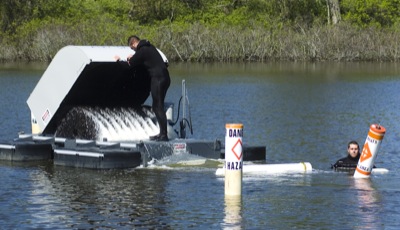Tuesday, May 4th, 2010
Company likely to build manure digester near Celina
By Nancy Allen
A private company wanting to build an anaerobic digester that turns manure into electricity is expected to break ground on a facility near Celina by the end of the year, Celina Community Development and Planning Director Kent Bryan said recently.
The company, Optional Energy Partners, Tampa, Fla., is deciding between three potential sites.
The company would finance, construct, own and operate the facility, which would produce electricity and commercial fertilizer from the manure. The city of Celina would be required to purchase electricity from the facility, Bryan said. Celina council members in March gave Bryan the green light to enter into negotiations with the company.
Bryan called the project a "big deal."
"Putting this into place could be significant longterm help for the lake and the local economy," he said. "It would give the ag community a place to take their manure and not have to worry about new regulations, which will likely continue to get worse."
Bryan said the facility gradually would bring on byproducts. Some of these may include compressed natural gas, biofuels, animal food supplements, dairy cattle bedding and nutrient-rich water for hydroponic farming.
The anaerobic digester is one of various ideas that Bryan has been researching to help with Grand Lake's excess nutrient and algae toxin problems. Other areas Bryan continues to look into include harvesting algae from the lake, securing grants to build sediment traps in lake tributaries and building wetlands.
The lake's poor water quality is caused by excess nutrient runoff that feeds the lake's blue-green algae. The state last year issued a water quality advisory due to an algae-produced toxin in the water. It's thought the announcement discouraged tourism and hampered the local economy.
The water quality advisory was lifted April 5 after toxin levels dropped below the World Health Organization's (WHO) guideline for concern. The WHO sets the recreational water exposure limit for the toxin at 20 parts per billion (ppb), a level considered a "moderate risk" to human health.
However, city officials expect the water quality advisory to be put back in place once the weather warms and the blue-green algae blooms. Much of the algae dies over the winter.

